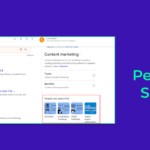Table Of Content
SEO is not always straightforward!
Some tactics fall into a grey area where…
…they don’t necessarily break the rules but raise moral questions. We are talking about the thin line between potential benefits and the risk of penalties.
Any guesses? We are talking about grey hat SEO.
Grey hat hacking falls in between ethical and unethical SEO, i.e. black hat and grey hat SEO. And this is where the confusion arises.
Being in this industry for a while, we have seen different opinions about this topic.
So, we have decided to cover this topic thoroughly.
Read This Complete Article And Learn:
- Grey Hat SEO.
- Techniques.
- Risk Associated With This.
- Ethical Considerations.
Are you ready to dive into the world of Grey Hat SEO? Let’s begin!
What Is Grey Hat SEO?

As the name suggests, Grey hat SEO is a mix of “white hat” and “black hat” techniques. Grey hat practitioners bend the rules without breaking them entirely.
These strategies are less risky than black hat techniques. However, risk is always there.
Grey hat SEO can offer short-term gains but risks penalties from search engines. It’s important to be cautious and prioritize long-term strategies.
Grey Hat SEO Techniques
Grey Hat SEO techniques occupy this middle ground. These strategies do not overtly violate search engine guidelines.
1. Link Purchasing

Buying links from other websites is a common Grey Hat SEO technique. While not explicitly illegal, it can harm your website’s credibility if overused.
Search engines prefer natural link-building over paid links.
But you can subtly boost your SERP ranking by strategically purchasing links from authoritative websites. Links should be relevant, meaningful, and contextual.
Hence, it makes it look natural and difficult for Google to detect or penalize.
2. Keyword Stuffing
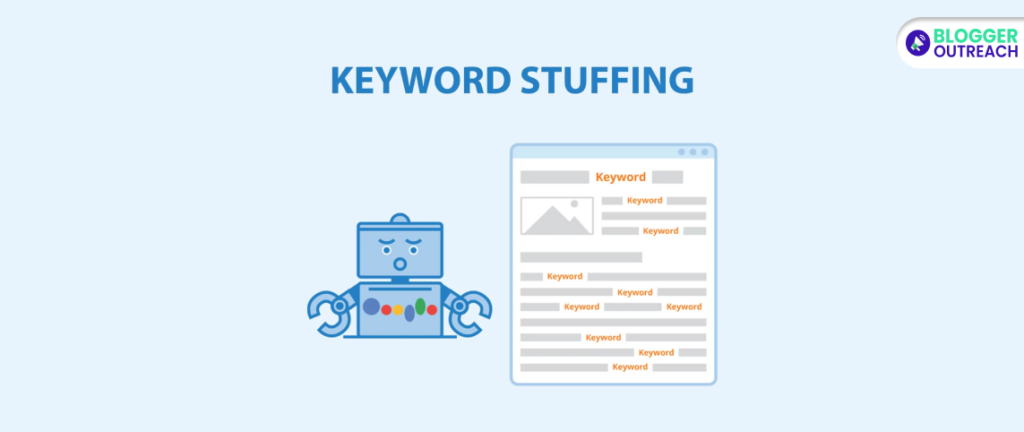
Keyword stuffing, or keyword saturation, involves excessively using keywords to rank higher. It’s a risky approach.
The key here is moderation. Incorporate keywords naturally into your content. Thus, you will maintain readability and relevance while avoiding the pitfalls of over-optimization.
3. Content Spinning

In content spinning, existing content is reworked to appear original. It’s basically taking content from another website and paraphrasing it smartly so that it can bypass plagiarism.
When using this technique, ensuring that the spun content is high quality and offers valuable information is important.
Your website’s reputation will be protected by avoiding producing low-quality, repetitive material.
4. Cloaking
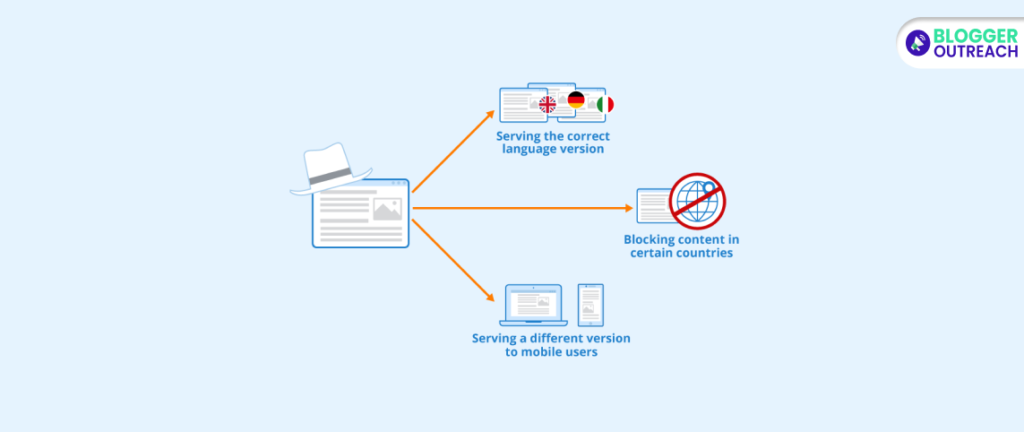
Cloaking involves displaying different content to users and search engines, a risky tactic. As search engines consider cloaking unethical and deceptive, it is actively penalized by them.
Avoid this method if you want to protect your website’s integrity and reputation.
5. Private Blog Networks (PBNs)
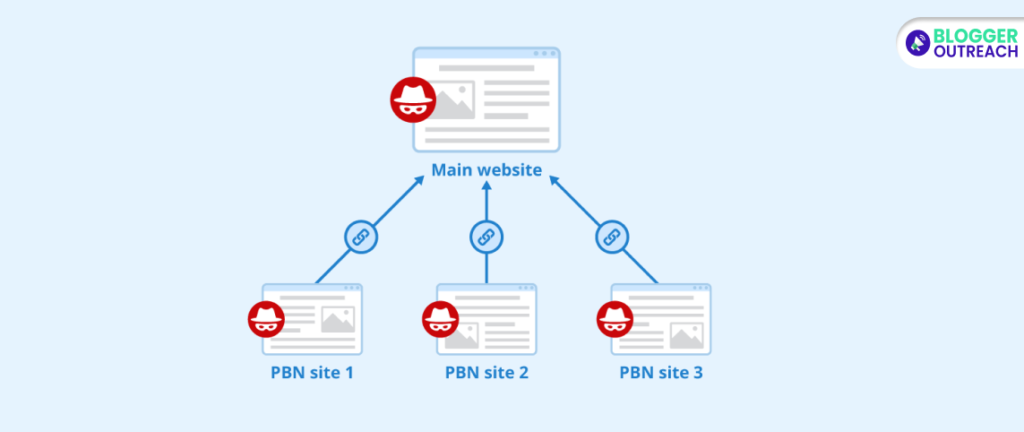
Private Blog Networks consist of websites owned by a single entity or a group used to create backlinks to a target website. While PBNs can indeed boost a website’s rankings, they reside in a grey area.
Search engines, particularly Google, have implemented strict measures against PBNs. They actively seek and penalize websites associated with such networks, potentially causing severe harm to your organic search traffic. Proceed with caution.
6. Social Media Automation

Automating social media actions to boost engagement is another Grey Hat technique. While it may temporarily increase visibility, it carries significant risks.
Increasingly, search engines identify and penalize these manipulative tactics. So, weighing quick gains versus long-term results is essential.
7. Buying Expired Domains

Here is another popular grey hat technique. There are two common practices for this:
Apply a 301 redirect to transfer link power to your current domain, boosting its authority.
Find old content archives and republish them on the site to revive it as it was before the domain expired.
This can instantly create a successful website with targeted traffic. However, search engines may scrutinize the intent behind acquiring expired domains.
It’s essential to use them judiciously, transparently, and with a clear strategy in mind to avoid potential pitfalls.
8. Negative SEO

Negative SEO involves attempts to harm a competitor’s website’s search engine rankings.
Despite being considered a Grey Hat tactic, search engines actively penalize such actions, and negative SEO can have severe repercussions.
Focusing on improving your website’s SEO rather than undermining others is far more advisable.
Risks Involved In Grey Hat SEO
Using Grey Hat SEO techniques poses significant risks. Penalties from search engines, like Google, can harm your website.
These Penalties May:
🚫lead to decreased visibility.
🚫lower rankings.
🚫even complete removal from search results.
Affiliated websites, such as those you might collaborate with, can also be penalized. This affects not just your site but also your partners’.
The long-term impact on your website’s success and reputation is crucial. Penalties can haunt you for a long time, making it hard to recover lost ground.
🚫Moreover, a tarnished reputation can erode trust among your audience. Users are less likely to engage with a site associated with questionable SEO practices.
Ultimately, sticking to ethical White Hat SEO for sustainable success and a positive online reputation is better.
Ethical Considerations Of Grey Hat SEO
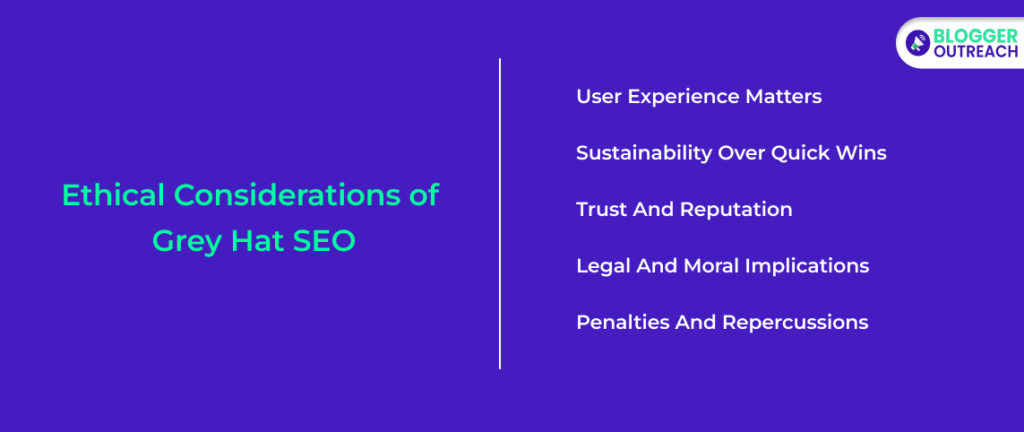
Grey Hat SEO techniques often tread a fine line between acceptable and questionable practices. While they may provide short-term gains, they come with ethical concerns with lasting consequences. Here’s why you should prioritize ethics and user-centricity:
1. User Experience Matters
Ethical SEO places the user at the forefront. It’s about providing a seamless and valuable experience. Grey Hat tactics, on the other hand, can disrupt this experience. Techniques like cloaking and excessive keyword stuffing can impact a website’s negative perception.
2. Sustainability Over Quick Wins
Grey Hat SEO may offer quick wins, but it often lacks sustainability. When search engines detect these tactics, penalties can be severe. Prioritizing ethical SEO ensures that your website’s growth is built on a solid foundation. Doing so will reduce the risk of abrupt drops in rankings.
3. Trust And Reputation
Ethical SEO is about building and maintaining trust. Users and search engines prefer websites that offer genuine value. You risk damaging your website’s reputation by engaging in Grey Hat SEO. When trust is lost, it is difficult to rebuild it.
4. Legal And Moral Implications
Many Grey Hat techniques operate in a grey area, neither explicitly legal nor illegal. Engaging in these practices can have legal and moral implications. It’s essential to consider the potential consequences of SEO from a legal and ethical standpoint.
Ethical SEO is about playing the long game. It means producing high-quality content. It helps in earning natural backlinks and provides an exceptional user experience. In contrast to Grey Hat tactics, ethical SEO ensures your website’s long-term growth and stability.
5. Penalties And Repercussions
Grey Hat SEO techniques can lead to penalties from search engines. These penalties can result in your website being deindexed or pushed down in search results. This can have a substantial negative impact on your traffic and business.
Final Verdict
Grey hat SEO is more about the intentions behind the techniques than the techniques themselves.
It’s important to remember that Google regularly updates its guidelines. What was once considered a grey hat technique may cross over into black hat territory with a single update. And getting a penalty is not something you wish for.
This is where we, BloggerOutreach, come in! We specialize in white-hat SEO and link-building techniques. Our focus is on long-term benefits rather than short-term gains. Importantly, we always abide by search engine rules and adjust to new updates.
We believe that it’s not worth jeopardizing your reputation and long-term success for a quick boost in rankings.
Would you like to know more about White Hat SEO services?
Read More:


